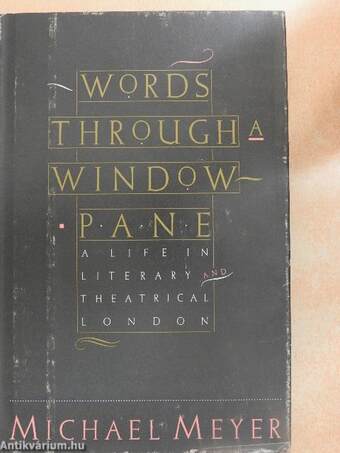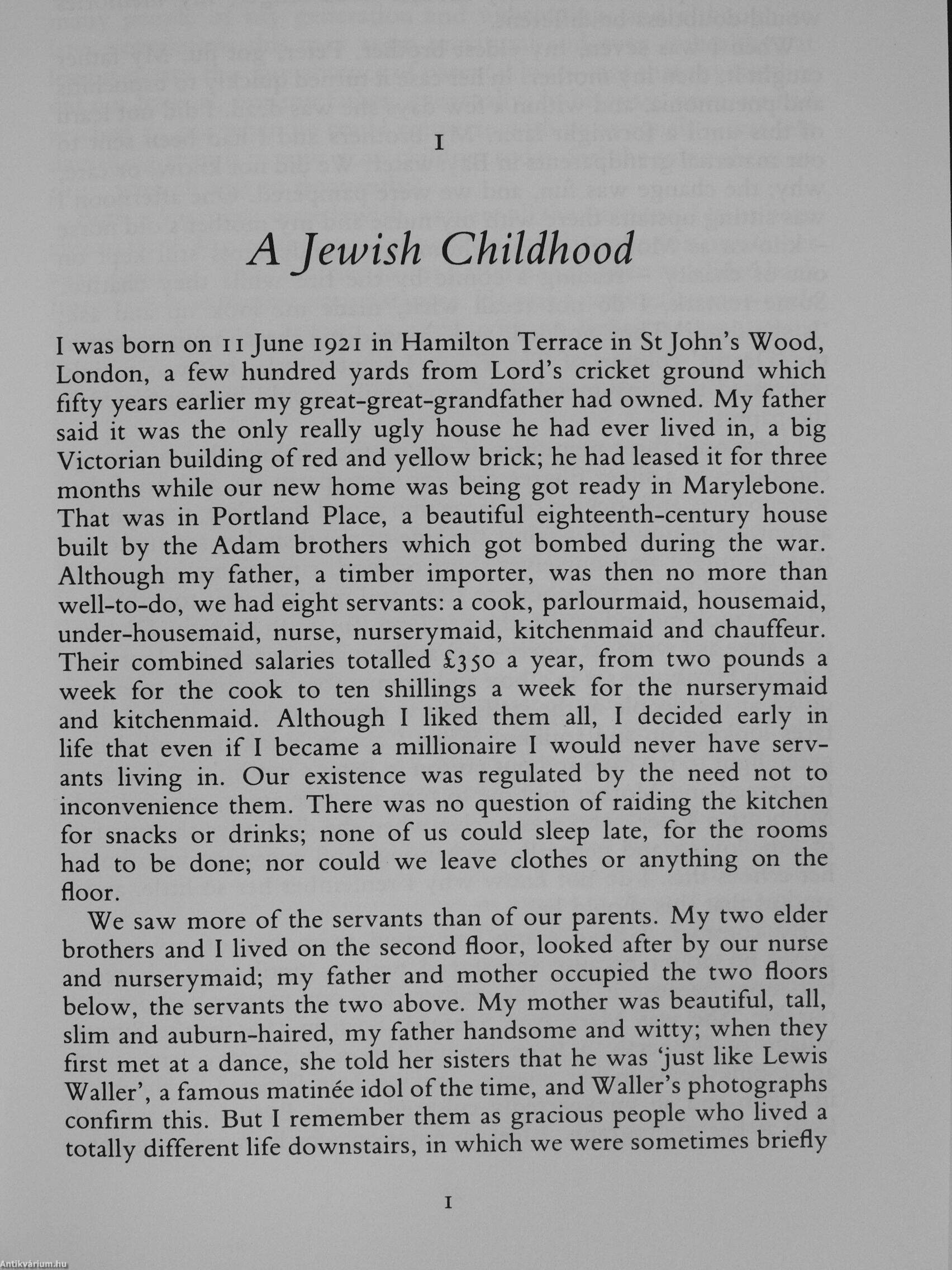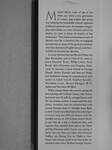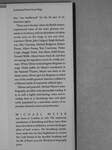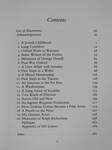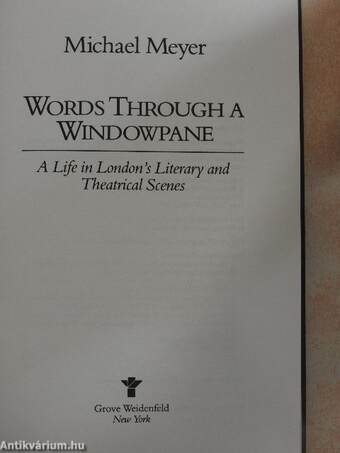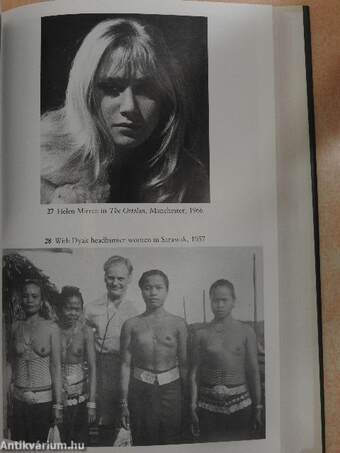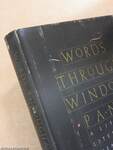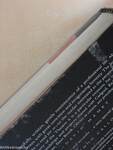1.066.795
kiadvánnyal nyújtjuk Magyarország legnagyobb antikvár könyv-kínálatát

VISSZA
A TETEJÉRE
JAVASLATOKÉszre-
vételek
Words Through a Windowpane
A Life in London's Literary and Theatrical Scenes
| Kiadó: | Grove Weidenfeld |
|---|---|
| Kiadás helye: | New York |
| Kiadás éve: | |
| Kötés típusa: | Félvászon |
| Oldalszám: | 291 oldal |
| Sorozatcím: | |
| Kötetszám: | |
| Nyelv: | Angol |
| Méret: | 24 cm x 16 cm |
| ISBN: | 0-8021-1121-1 |
| Megjegyzés: | További fotósok a könyvben. Fekete-fehér fotókkal. |
naponta értesítjük a beérkező friss
kiadványokról
naponta értesítjük a beérkező friss
kiadványokról
Előszó
TovábbFülszöveg
Michael Meyer came of age in the 1940s, just when a new generation of writers, playwrights and actors was initiating the remarkable cultural explosion of Britain's postwar years. As translator, biographer and scholar, as a man of letters and of the theatre, he came to know the leaders of this renaissance. This utterly enchanting account of Meyer's own life is therefore also an engaging introduction to many of the great personalities who have dominated English literary and theatrical life for the past four decades.
As a boy Michael had met Bernard Shaw and Max Beerbohm, and at Oxford he came to know Kenneth Tynan, Philip Larkin, Peter Brook, John Mortimer and Kingsley Amis. Later he became a close friend to George Orwell, Arthur Koestler and Mervyn Peake, and numbered among his acquaintances such names as Edith Sitwell, Stephen Spender, Wyndham Lewis, Terence Rattigan, W H. Auden and Vita Sackville-West.
When young Meyer discovered, during his first meeting with Graham Greene,... Tovább
Fülszöveg
Michael Meyer came of age in the 1940s, just when a new generation of writers, playwrights and actors was initiating the remarkable cultural explosion of Britain's postwar years. As translator, biographer and scholar, as a man of letters and of the theatre, he came to know the leaders of this renaissance. This utterly enchanting account of Meyer's own life is therefore also an engaging introduction to many of the great personalities who have dominated English literary and theatrical life for the past four decades.
As a boy Michael had met Bernard Shaw and Max Beerbohm, and at Oxford he came to know Kenneth Tynan, Philip Larkin, Peter Brook, John Mortimer and Kingsley Amis. Later he became a close friend to George Orwell, Arthur Koestler and Mervyn Peake, and numbered among his acquaintances such names as Edith Sitwell, Stephen Spender, Wyndham Lewis, Terence Rattigan, W H. Auden and Vita Sackville-West.
When young Meyer discovered, during his first meeting with Graham Greene, that Greene had never met Orwell, he arranged lunch with the two famous writers. It wasn't until the mid-fifties, however, that his relationship with Greene became close,- he brought Anita Bjork to meet Greene on a blind date, thus ushering in Greene's long and difficult liaison with the Swedish actress. In 1959 Greene invited Meyer to join him on a trip to Southeast Asia, and together they traveled there and to Fiji, Tahiti and San Francisco while Greene was writing A Burnt-Out Case. Five years later, when François Truffaut was filming Day for T^ipht in Nice, Meyer had Greene stand in for him under an assumed name when Truffaut thought Meyer's
áWÉÉÉiiÉ
(continued from front flap)
face "too intellectual" for the bit part of an insurance agent.
Those were the days when the British theatre experienced some of the most glorious moments in its history, with an abundance of talent rarely seen on the stage at any one time. Laurence Olivier, John Gielgud, Ralph Richardson, Alec Guinness, Michael Redgrave, Robert Donat, Albert Finney Tom Courtenay, Vivien Leigh, Maggie Smith, Alan Bates, Edith Evans, Donald Wolfit—Meyer knew them all, and they are among the legendary actors he vividly portrays. When Olivier invited Ingmar Bergman to stage liedda Qabkr (in Meyer's translation) at the National Theatre, Meyer was there at the dinner party Olivier gave for Bergman at which two of the world's greatest charmers collided in a hilarious battle of exquisitely inflated egos.
Urbane and graceful, Michael Meyer's autobiography provides truly pleasurable reading. It is, as well, a highly entertaining, witty and revealing look at a fascinating time and place richly populated by a marvelous variety of supremely talented writers and performers.
MICHAEL MEYER was born in London in 1921. His numerous translations of Strindberg and Ibsen have often been described as definitive, as have his biographies of both writers. His Strindberg translations made him the first Englishman to receive the Gold Medal of the Swedish Academy, and his life of Ibsen won the Whitbread biography prize. Vissza
Témakörök
- Irodalomtörténet > Írókról, költőkről
- Idegennyelv > Idegennyelvű könyvek > Angol > Művészetek > Színház
- Idegennyelv > Idegennyelvű könyvek > Angol > Szépirodalom > Regény, novella, elbeszélés
- Idegennyelv > Idegennyelvű könyvek > Angol > Irodalomtörténet
- Irodalomtörténet > Irodalomtudomány > Korszakok > 20. századi
- Szépirodalom > Regény, novella, elbeszélés > Az író származása szerint > Európa > Nagy-Britannia
- Művészetek > Színház > Színháztörténet > Külföldi
- Művészetek > Színház > Idegen nyelv > Angol
- Szépirodalom > Regény, novella, elbeszélés > Tartalom szerint > Életrajzi regények > Önéletrajzok, naplók, memoárok



